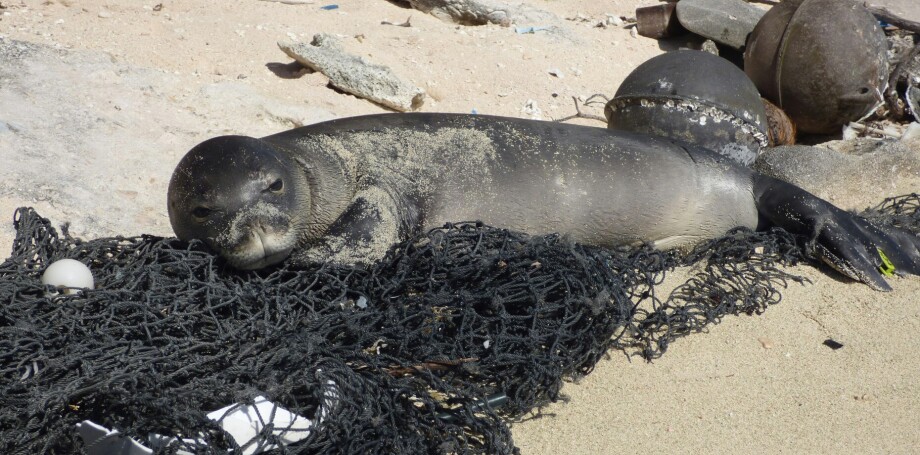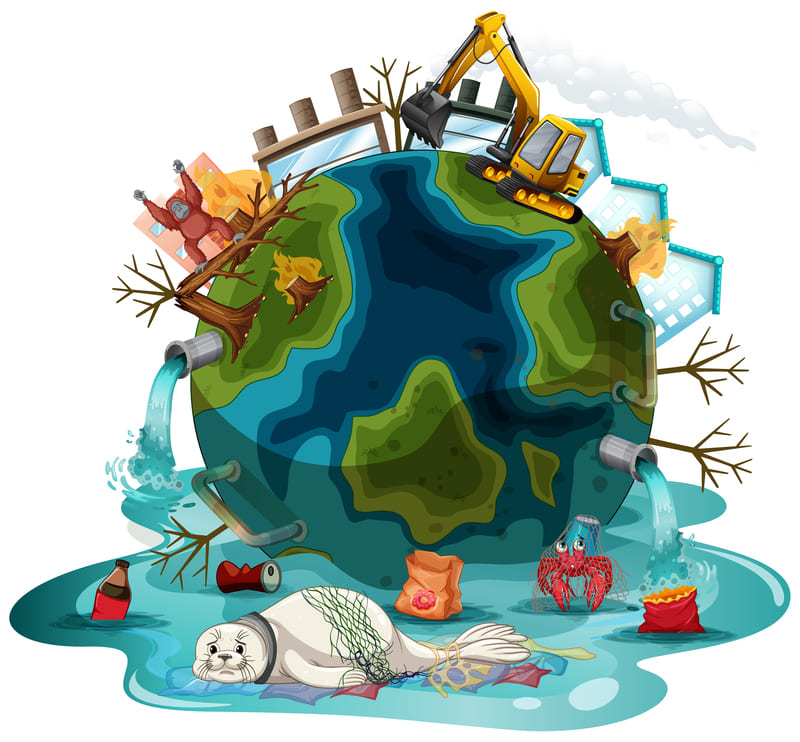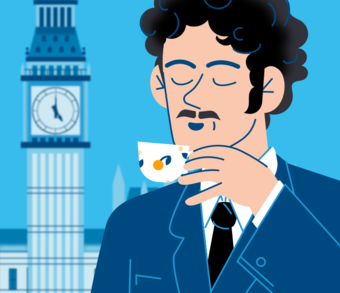План урока английского для 10 класса по теме Environmental pollution

Готовый план урока, который подойдет для обучения как на занятии в школе, так и на онлайн-уроке.
Цель: развивать речевые умения и навыки учащихся по теме Environmental pollution.
Задачи:
- освоить лексику по теме Environmental pollution;
- совершенствовать навыки устной речи по теме;
- использовать грамматические конструкции.
План урока:
- Warm-up.
- Lead-in.
- Vocabulary presentation.
- Vocabulary practice.
- Revision of grammar.
- Speaking practice.
- Sum up.
1. Warm-up
Учитель показывает картинку и задает вопросы, привлекая внимание к проблеме.
You can say, “Look at the picture. What is happening with our Earth? Do you think our planet is in danger? Why (not)?
Who is responsible for our planet? Can people save the planet? What organisations that try to protect the planet do you know?”

2. Lead-in
Учителю необходимо ввести детей в диалог. Тема может показаться многим студентам скучной и даже слишком научной. Мы не эксперты в теме экологии, но сможем доступно объяснить ученикам причины возникновения различных природных катаклизмов и последствия неэкологичного поведения.
What associations do you have when you look at the pic? Tick them.
- pollution
- garbage
- litter
- bad smell
- factories
- clean air
- fishing
- smog
- fog
- dirty
- eco-friendly
- organic food
- extinction of animals
У нас есть и другие планы уроков английского языка для школьников:
3. Vocabulary presentation
A. Объясните произношение следующих слов для дальнейшей коммуникации. Покажите транскрипцию, попросите произнести слова несколько раз.
Look at these words and repeat after me: reason, consequence, drought, flood.
/ˈriːzn/, /ˈkɒnsɪkwəns/, /draʊt/, /flʌd/
B. Прочитаем определения слов, поработаем с их значением и синонимами.
Let us explain these words:
consequence — the result of the action
drought — long period without rain
flood — water covering an area that is normally dry
to cause — to make smth happen
- Какова причина этого кризиса?
- Каковы последствия этой операции?
- Отсутствие дождей повлечет за собой засуху.
- Наводнение — это последствие повышения уровня воды в реке.
Попросите учеников прочитать слова и их определения, при необходимости перевести.
Let’s read the definitions:
impact — the effect on smth
mass tourism — rest in popular hotels and places
plant — a factory
pollution — damage caused to water, air by harmful waste
to reduce — to make less
wildlife — animals and birds living in nature
4. Vocabulary practice
Слов достаточно много, поэтому тщательно проработайте их в разных упражнениях, обсудите, подберите к ним ассоциации, постройте словосочетания с этими словами.
Подберем словосочетания и ассоциации.
You can say, “Give examples of mass tourism. Where do people spend time? Is it eco-friendly?
What can we reduce? Reduce eating sugar, reduce caffeine, reduce salary, reduce costs.
Are there any plants in your town? Do they produce smog over the city? What is the impact on the environment? What kind of pollution does it cause?
Translate word combinations:
- влияние на окружающую среду, на жизнь и здоровье людей;
- уменьшить пенсионный возраст, уменьшить количество фастфуда;
- влечет за собой наводнение, загрязнение окружающей среды.
pactim
lifewild
oofld
quenceconse
resona
drughot
What is the missing letter?
enviro_mentally friendly
impa_t
ma_s tourism
pla_t
po_lution
to redu_e
w_ldlife
re_son
conse_uence
drou_ht
flo_d
to ca_se
Давайте проверим понимание новых слов в предложениях.
Choose the correct options to complete the sentences.
- There are a lot of plants in this area. This can lead/cause air ecology/pollution. It is so dirty that it’s difficult to breathe.
- People can cut/reduce pollution if they walk more or cycle.
- Volunteers go to the countryside to plant/impact trees.
- Driving an electric car can help to improve mass tourism / ecology.
- Even little steps you take can have a great impact/willpower on nature and wildlife.
- Last summer was the hottest one, many regions suffered from rain/drought.
- What causes/brings floods/rain?
Fill in the gaps with the missing words, some of them can be used more than once:
- reasons
- consequences
- drought
- flood
- environmentally friendly
- impact
- mass tourism
- plants
- pollution
- reduce
- wildlife
- Is _____ a big problem where you live? Are there many _____ that produce smog?
- Can walking help to _____ pollution? Why do you think so?
- When was the last time you travelled? Was it eco or _____ tourism?
- What can you do to help the _____ in your area?
- What are some of the most _____ things you do?
- What is the _____ on the ecology from people not using green energy?
- What is better: ecotourism or _____? Why?
- How can people protect animals, birds and other _____?
- What are the _____ of natural catastrophes? What _____ can be after tsunamis, hurricanes, _____, _____?
Вам могут пригодиться и другие материалы и упражнения для уроков английского со старшеклассниками:
5. Revision of grammar
Повторим Conditional II в контексте урока.
Напомним значение и формулу этой грамматической формы.
- If we sorted rubbish, it would change the climate a lot.
- If we used bikes, it would be better for the environment.
Answer the questions and discover the rules.
Are these sentences real or imagined situations?
- They are real situations.
- They are imagined situations.
- We don’t know that.
Which construction is used in the main part of the sentences?
- would + verb
- will + verb
- verb
Which tense is used in the if-part of the sentences?
- Present Simple
- Past Simple
- Сomplete the sentences with the words in the correct form
of Conditional II
- If I (win) the lottery, I (donate) the money to protect the environment.
- What you (do) if you (be) an environmental activist?
- If I (be) a politician in our country, I (make) a law to use only green energy.
- If people (stop) driving, scientists (invent) some kind of green transportation.
- If all plants (use) eco-friendly tools, there (be) no pollution.
- Complete the sentences with your own ideas using Conditional II
- If I were an environmental activist, I…
- If all people reduced the amount of plastic packaging…
- If we could afford us to use electric cars…
- If I went shopping, I…
- It would have a positive impact if…
- If you turned off the water…
- If there were no factories…
- It would help our planet if…
C. Translate using Conditional II
- Если бы я был мэром, я бы сделал наш город чище и зеленее.
- Если бы все школьники были волонтерами, было бы меньше мусора в городе.
- Если бы люди летали на самолетах реже, они бы не так сильно вредили планете.
- Если бы заводы не производили смог, воздух был бы загрязнен гораздо меньше.
- Если бы люди знали о последствиях природных катаклизмов, они бы защищали окружающую среду.
- Если бы детям в школе рассказывали о причинах засухи, пожаров, цунами, они бы предпочитали экотуризм, а не массовый туризм.
- Если бы мы понимали, какое влияние оказывают на экологию машины, мы бы передвигались пешком и ездили на велосипедах чаще.
6. Speaking practice
Предложите студентам посмотреть видео. Обратите внимание на то, как каждый из нас может бережнее относиться к природе.
What can each of us do to save the planet?
Is it difficult to turn off the water when you brush your teeth?
Is it pleasant to cycle instead of taking a bus? Can it reduce air pollution?
Do you sort rubbish in your family? Is it a good idea? Why?
Do you always buy a plastic bag in a supermarket if you go shopping?
Use these ideas to help you answer the questions:
- eating vegetarian meals at least one day a week;
- using less water;
- walking or biking whenever it is possible;
- using LED lights;
- wasting less food;
- buying less stuff;
- reusing things;
- reducing the amount of plastic packaging;
- using electric cars, cycling;
- using shopping bags every time you go shopping;
- turning off the water when you brush your teeth;
- recycling your old clothes instead of throwing them away.
Сам могут заинтересовать другие статьи по теме:
7. Sum up
Подведем итоги.
What words did you learn? Can you give synonyms to the following words?
to reduce
consequences
reason
to cause
Now I can:
- talk about environmental pollution;
- use new vocabulary to talk about ways to help the environment;
- use Conditional II to talk about helping the environment.
Надеемся, что этот план урока английского для 10 класса вам понравился. Поделитесь в комментариях, на какие темы вам еще нужны материалы.




















 Татьяна Тюменцева
Татьяна Тюменцева 
 Анастасия Юферева
Анастасия Юферева 
 Павел Усов
Павел Усов 
 Анна Тетерина
Анна Тетерина 
 Светлана Митина
Светлана Митина 
Superb! Thanks for the explaining each stage of the lesson in details!
Thank you so much for the exciting and useful materials!